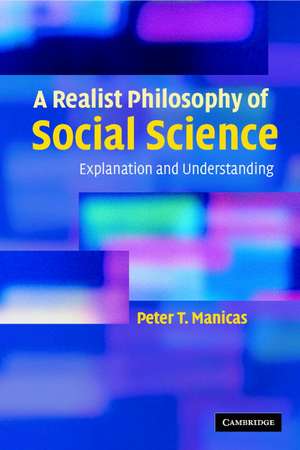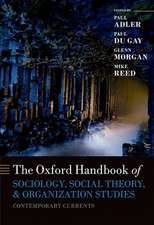A Realist Philosophy of Social Science: Explanation and Understanding
Autor Peter T. Manicasen Limba Engleză Paperback – 14 iun 2006
| Toate formatele și edițiile | Preț | Express |
|---|---|---|
| Paperback (1) | 294.65 lei 6-8 săpt. | |
| Cambridge University Press – 14 iun 2006 | 294.65 lei 6-8 săpt. | |
| Hardback (1) | 451.64 lei 6-8 săpt. | |
| Cambridge University Press – 14 iun 2006 | 451.64 lei 6-8 săpt. |
Preț: 294.65 lei
Nou
Puncte Express: 442
Preț estimativ în valută:
56.39€ • 58.65$ • 46.55£
56.39€ • 58.65$ • 46.55£
Carte tipărită la comandă
Livrare economică 15-29 aprilie
Preluare comenzi: 021 569.72.76
Specificații
ISBN-13: 9780521678582
ISBN-10: 0521678587
Pagini: 236
Ilustrații: 4 graphs
Dimensiuni: 152 x 229 x 18 mm
Greutate: 0.32 kg
Editura: Cambridge University Press
Colecția Cambridge University Press
Locul publicării:Cambridge, United Kingdom
ISBN-10: 0521678587
Pagini: 236
Ilustrații: 4 graphs
Dimensiuni: 152 x 229 x 18 mm
Greutate: 0.32 kg
Editura: Cambridge University Press
Colecția Cambridge University Press
Locul publicării:Cambridge, United Kingdom
Cuprins
1. Explanation and understanding; 2. Theory, experiment and the metaphysics of Laplace; 3. Explanation and understanding in the social sciences; 4. Agents and generative social mechanisms; 5. Social science and history; 6. Markets as social mechanisms.
Recenzii
'With this book Manicas has filled a major need in the philosophy of social science, which has not given adequate critical attention to the problem of explanation. His argument that understanding not explanation as such is the primary goal of the sciences entails a wider assessment of the philosophy of the social sciences. This is an original contribution as well as being an important and very convincing statement of realism. It is likely to become a key work in the field.' Gerard Delanty, Professor of Sociology, University of Liverpool
'Despite their protestations to the contrary, scientists have always been influenced, often to the detriment of their projects, by philosophy. In this timely volume Peter Manicas offers a systematic defence of scientific realism as the philosophical framework for the social sciences. Parallel to the way the natural sciences propose explanations by causal mechanisms, the social sciences should propose their own form of 'causality', active agents making use of systems of meaningful actions to accomplish their ends. In his comprehensive study of how the social sciences might be, Manicas works out this insight in various contexts with powerful effect. One can only hope that, at last, the spectre of naïve empiricism will finally be exorcised from the social sciences.' Horace R. Harre, Distinguished Research Professor, Georgetown University
'Neo-positivist, interpretive, and postmodernist social science are often seriously confused about fundamental issues of explanation, causation, interpretation, and understanding. Critical realism offers the best alternative account of the social scientific task and the most sensible resolution of our widespread confusions. Peter Manicas makes an important contribution to developing such a critical realist approach to social science that can help to re-orient our scholarly visions in smarter, more realistic, and fruitful directions.' Christian Smith, Professor of Sociology, University of Notre Dame
'Despite their protestations to the contrary, scientists have always been influenced, often to the detriment of their projects, by philosophy. In this timely volume Peter Manicas offers a systematic defence of scientific realism as the philosophical framework for the social sciences. Parallel to the way the natural sciences propose explanations by causal mechanisms, the social sciences should propose their own form of 'causality', active agents making use of systems of meaningful actions to accomplish their ends. In his comprehensive study of how the social sciences might be, Manicas works out this insight in various contexts with powerful effect. One can only hope that, at last, the spectre of naïve empiricism will finally be exorcised from the social sciences.' Horace R. Harre, Distinguished Research Professor, Georgetown University
'Neo-positivist, interpretive, and postmodernist social science are often seriously confused about fundamental issues of explanation, causation, interpretation, and understanding. Critical realism offers the best alternative account of the social scientific task and the most sensible resolution of our widespread confusions. Peter Manicas makes an important contribution to developing such a critical realist approach to social science that can help to re-orient our scholarly visions in smarter, more realistic, and fruitful directions.' Christian Smith, Professor of Sociology, University of Notre Dame
Notă biografică
Descriere
In this volume, Peter Manicas brings the idea of causality to bear on inquiry in social sciences.















